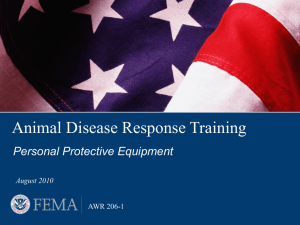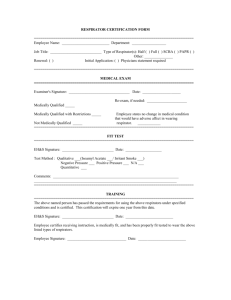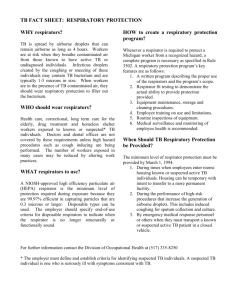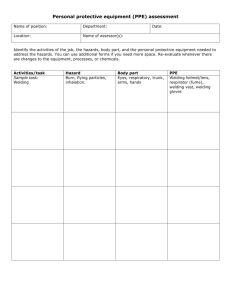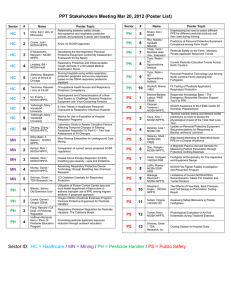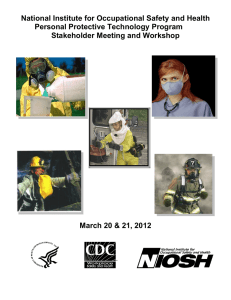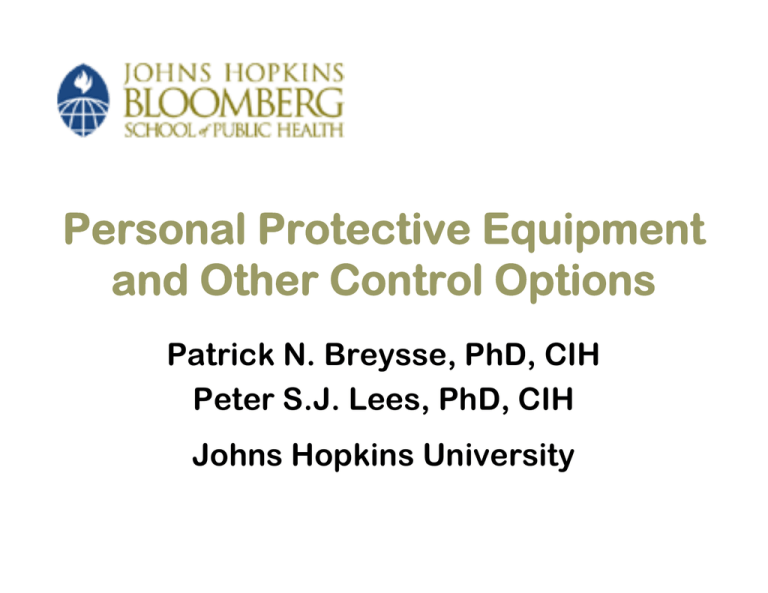
Personal Protective Equipment
and Other Control Options
Patrick N. Breysse, PhD, CIH
Peter S.J. Lees, PhD, CIH
Johns Hopkins University
This work is licensed under a Creative Commons Attribution-NonCommercial-ShareAlike License. Your use of this
material constitutes acceptance of that license and the conditions of use of materials on this site.
Copyright 2006, The Johns Hopkins University, Patrick Breysse, and Peter S. J. Lees. All rights reserved. Use of
these materials permitted only in accordance with license rights granted. Materials provided “AS IS”; no
representations or warranties provided. User assumes all responsibility for use, and all liability related thereto, and
must independently review all materials for accuracy and efficacy. May contain materials owned by others. User is
responsible for obtaining permissions for use from third parties as needed.
Section A
Introduction
Opportunities for Control
source - transmission - receptor
Source: Peter Lees
4
Personal Protective Equipment
Many kinds
– Respirators
– Clothing
– Hard hats
– Safety shoes
– Face shields
Continued
– Hearing
protectors
– Gloves
– Safety glasses
5
Use and Misuse of PPE
Personal protective equipment is widely
used
Frequently inappropriate application or
wrong equipment
Specification of wrong PPE may result
in higher exposure than use of no PPE
Must know proper uses and limitations
6
Time Required for Solvent to
Penetrate 1/1000 inch of Material
Protective Material
Butyl Rubber
1,2dichloromethane
6.4 min
Neoprene rubber latex
0.9 min
Nitrile rubber latex
0.3 min
Polyethylene
1.2 min
Surgical rubber latex
0.2 min
Viton
82 min
7
PPE and Training
8
PPE Performance over Time
9
PPE Certification Tests
A primary
influence on the
design and
performance of
PPE is
conformance with
the requirements
of the certification
tests
Source: NIOSH
10
PPE in Laboratory Test vs. Field
Source: U.S. Government
11
The Real Problem with PPE
Source: U.S. Government
12
Summary of PPE Limitations
Must match PPE to the hazard
Actual performance is always less than
that claimed by manufacturer or
indicated by testing
– Considerable variability among
manufacturers
Comfort and ease of use is important
Continued
13
Summary of PPE Limitations
Training in proper use of PPE is
required to achieve maximum possible
protection
PPE designed to pass certification test
– Need to know limitations of tests
If PPE isn’t used, it doesn’t work
14
Section B
Respiratory Protection
Respiratory Protective Equipment
Protect the respiratory system from
inhalation of airborne contaminants by
removing contaminants from the air
before they are inhaled
Supplying an independent source of
“clean” air
Viewed as control method of last resort
in the hierarchy of controls
16
Legitimate Uses of
Respiratory Protection
Emergency situations
– Spill clean-up
Short-term solutions where engineering
controls not feasible
– Asbestos removal jobs
While controls being installed
17
Types of Respirators
Air-purifying respirators
– Particulate-removing
• Positive or negative pressure
within the mask
– Gas-and-vapor-removing
• Positive or negative pressure
within the mask
Single or multiple use
Continued
18
Types of Respirators
Atmosphere-supplying respirator
– Higher level of protection than airpurifying respirator
Types
– Hose mask
– Air line
– Self-contained breathing apparatus
19
Air-Purifying Respirator
Air-purifying elements
appropriate to
contaminant (filter or
adsorbent)
Operates under
negative pressure
(seal/leaks)
Determination of
service life
Source: NIOSH
20
Powered Air-Purifying
Respirator
Air-purifying elements
appropriate to
contaminant (filter or
adsorbent)
Operates under positive
pressure (seal/leaks)
Determination of service
life (and associated
limitations)
Source: NIOSH
21
Air Line Respirator
Source: NIOSH
22
Self-Contained
Breathing Apparatus
Flow regime
– Demand
– Pressure demand
– Continuous flow
23
Protection Factors
Respirator performance rated by
protection factor
Determined for respirator type
[conta min ant outside ]
PF =
[conta min antinside ]
Continued
24
Protection Factors
Example
– Workplace air concentration 50 ppm
benzene
– Inside respirator 2 ppm benzene
50ppm
PF =
= 25
2ppm
25
Comparison of Protection Factors
Respirator Type
PF
Half-mask air-purifying
10
Half-mask powered air-purifying
50
Half-mask air-line (demand)
10
Half-mask air-line (continuous flow)
50
Half-mask air-line (pressure demand)
1000
Full-face piece air line (pressure
demand)
SCBA (pressure demand)
2000
10,000
26
Section C
Respiratory Protection Programs
Respirator Programs
OSHA requires written programs
defining the procedures by which
respiratory protective equipment is
selected, stored, maintained, and
repaired
Procedures for determining if persons
required to wear respiratory protective
equipment are medically fit, trained in
its use, and evaluated
28
Respirator Selection
Select based on hazard
– Implies identification of hazard and
knowledge of its magnitude through
investigation/measurement
Use NIOSH-certified respirators
Provide sufficient number of respirator
models and sizes to fit users
Respirator Decision Logic
– www.cdc.gov/niosh/87-108.html
29
Medical Evaluation
Required before RPE use
Evaluation by physician or licensed
health care professional
Questionnaire or examination as
specified in 29 CFR 1910.134(e)
Mandatory exam for
positive response to
specified questions
Source: NIOSH
30
Fit Testing
Qualitative fit
tests
– simple to
conduct
– For PF<100
Source: NIOSH
Continued
31
Fit Testing
Quantitative fit
testing
– Fit testing
booth and
associated
equipment
– For PF >100
Source: NIOSH
32
Training
Annual; “comprehensive and
understandable”
Selection of respirator
Inspection of respirator
Use of respirator
Cleaning of respirator
Storage of respirator
Source: NIOSH
Source: NIOSH
33
Maintenance and Care
Cleaning and disinfection
Storage
Inspection
– Emergency use
– Routine use
Repair
Source: NIOSH
34

